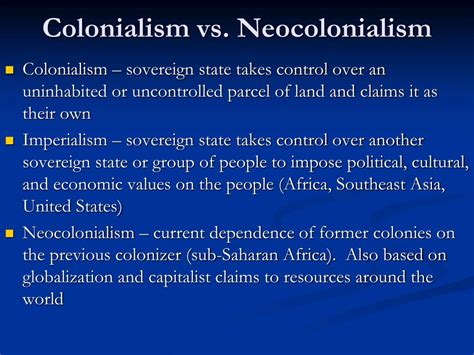Definition and Characteristics of Neocolonialism
Neocolonialism, a subtle and indirect form of colonialism that emerged after the decolonization era, represents a continuation of colonial power dynamics without formal political control. It manifests through economic, political, and cultural influences that maintain the dominance of former colonizers over former colonies.

Key Characteristics:
- Economic dependence on former colonizers
- Political influence through international organizations and foreign aid
- Cultural hegemony through education, media, and popular culture
Effects of Neocolonialism
Neocolonialism has profound and multifaceted effects on former colonies, perpetuating inequalities and hindering their development.
Economic Consequences:**
- Exploitation of natural resources and cheap labor
- Dependence on foreign markets and investment
- Lack of economic diversification and industrialization
Economic Figures:
- The IMF estimates that developing countries lose over $1 trillion annually due to tax evasion and illicit financial flows.
- The World Bank reports that 70% of the world’s poorest countries are heavily indebted to foreign lenders.
Political Consequences:**
- Interference in internal affairs through foreign aid and international organizations
- Support for corrupt and authoritarian regimes
- Suppression of political dissent and human rights abuses
Political Figures:
- According to Amnesty International, over 100 countries have laws that restrict freedom of expression.
- The Carter Center found that 60% of African governments were autocratic or semi-autocratic in 2020.
Socio-Cultural Consequences:**
- Cultural assimilation and loss of national identity
- Promotion of Western values and lifestyles
- Suppression of indigenous languages and cultural practices
Socio-Cultural Figures:
- UNESCO reports that nearly half of the world’s languages are critically endangered or extinct.
- The World Economic Forum estimates that cultural industries contribute over $2 trillion to the global economy.
Neocolonialism in AP Human Geography
AP Human Geography explicitly addresses neocolonialism as a key concept in understanding contemporary global issues.
Key Learning Objectives:
- Analyze the economic, political, and cultural dimensions of neocolonialism
- Examine the effects of neocolonialism on developing countries
- Evaluate the challenges and potential solutions for addressing neocolonialism
Overcoming Neocolonialism
Addressing neocolonialism requires multifaceted strategies that empower former colonies and promote their self-determination.
Decolonization Policies:**
- Promote national sovereignty and economic independence
- Support sustainable development and industrialization
- Reform international economic institutions
Political Empowerment:**
- Strengthen democratic institutions and promote human rights
- Increase transparency and accountability in government
- Reduce foreign interference in internal affairs
Cultural Preservation:**
- Protect and revitalize indigenous languages and cultures
- Promote education that values diversity and inclusivity
- Counter Western cultural hegemony through alternative media and arts
FAQs about Neocolonialism in AP Human Geography
1. What are the main causes of neocolonialism?
- Historical power dynamics and economic interests
- Continued political and economic dependence of former colonies
- Global capitalism and the need for cheap labor and resources
2. How can neocolonialism be distinguished from traditional colonialism?
- Neocolonialism lacks direct political control but maintains influence through economic, political, and cultural means.
- Traditional colonialism involved formal political administration and territorial occupation.
3. What are the benefits of neocolonialism to former colonizers?
- Continued access to markets and resources
- Strategic influence over geopolitical regions
- Preservation of cultural and linguistic dominance
4. What are the benefits of neocolonialism to former colonies?
- Potential access to foreign aid and investment
- Opportunity for economic development and technological advancement
- Exposure to new ideas and perspectives
5. What are the pros and cons of neocolonialism?
Pros:
- Potential for economic growth and development
- Access to foreign aid and investment
- Exposure to new ideas and perspectives
Cons:
- Perpetuation of economic dependence
- Suppression of political and cultural autonomy
- Loss of national identity
6. What are the challenges to overcoming neocolonialism?
- Resistance from former colonizers
- Internal corruption and weak governance in former colonies
- Global economic and political power structures that favor neocolonialism
7. What are some examples of neocolonialism in the contemporary world?
- Economic dominance of Western corporations in developing countries
- Interference in internal affairs of former colonies by international organizations
- Promotion of Western values and lifestyles through popular culture
8. What are potential solutions to neocolonialism?
- Decolonization policies and support for self-determination
- Political empowerment and strengthening of democratic institutions
- Cultural preservation and promotion of diversity and inclusivity
Conclusion
Neocolonialism remains a formidable force in the contemporary world, perpetuating inequalities and hindering the development of former colonies. Understanding its complex dynamics and effects is crucial for students of AP Human Geography. By promoting policies of decolonization, political empowerment, and cultural preservation, geographers can contribute to a more just and equitable world.
